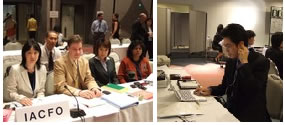| |
|
Photographs from 5th Codex Task Force meeting about foods derived from biotechnology
Over 260 delegates from 53 countries gathered here in Makuhari, Chiba for the meeting. The chairman was Dr. Hiroshi Yoshikura, who had also chaired the previous Task Force meetings. As an introduction, FAO made an interesting intervention, noting that consumers in many parts of the world are still questioning the safety of GMO foods. GMOs have attracted intensive debate and FAO shares some of the concerns. WHO's intervention noted that safety issues should be the basis of the work of this Task Force over the next four years. India mentioned that the Task Force should think about how the UN Millennium Goals of poverty reduction could be achieved. JOF/IACFO had permission to do a unique Internet radio broadcast from the meeting, and we got many comments about that development. UN Millennium Goals http://www.un.org/millenniumgoals/ 1) Ethical concerns in the discussion about GMO animals In a heated debate, delegates had difficulties agreeing on the work on a guideline for GMO animals. Australia and a drafting group proposed a good document, but it had no explicit reference to ethical considerations. The European Commission and IACFO raised the point that ethics should be mentioned, and that we felt the wording was not sufficiently clear on this important matter. While some countries, including India and Norway, agreed that ethics should be mentioned, other disagreed. Greenpeace International and 49 Parallell also supported this, and added that environmental factors should be mentioned as well. We are really disappointed by this result. It may be possible to discuss ethics during future Task Force meetings, but the way the document is worded now, some countries will argue against it even being mentioned again. For example the GMO plant guideline completed by the Task Force in 2003 says clearly that it does not address environmental or ethical concerns. Are people really going to repeat that for GMO animals? IACFO does not think there should be a Codex guideline on foods from GM animals, at this stage. FAO and WHO both commented that ethics is indeed important. FAO suggested that we could organize a workshop to discuss the topic the day before the next session 2006. The countries that do not want to mention ethics are arguing that this work will deal only with the scientific risk assessment of GMO foods, and that ethics are not a part of the risk assessment process. In the FAO/WHO Expert consultation from 2003, ethics was indeed discussed at lenght. That expert consultation concluded, among other things, that "Ethics is rooted both in the world religions and in secular philosophies, while a sense of morality and moral value is common for everbody. Ethics comprises both a positive dimension relating to our conceptions of the good life/society, and a negative dimension relating to our judgements of what is morally wrong. For instance, owing to religion-based food practices relating to eating pork, the utilization of genetic material from pigs could present problems." FAO/WHO Expert consultation from 2003: http://www.fao.org/es/ESN/food/risk_biotech_animal_en.stm 2) Other issues The discussion then moved on nutritionally modifed plants, as Canada had prepared a document. There is support for this work and the chair also indicated that input from developing countries will be very important for the work on this topic. Canada will chair an electronic working group on this topic, and so many countries indicated that they want to participate. Some other topics that were discussed briefly included "stacked genes" and "nutritionally enhanced foods". IACFO supported work in these areas, as some of these plants have already entered the market. Also post-market surveillance, as well as foods from animals that have received recombinant vaccins, were mentioned as topics that may be covered. The next meeting of the Task Force will be held November 27 - December 1, 2006 here in Makuhari, Chiba, Japan.
|
||||||||||||||||||||||||||||||||||||||||||||
|
Copyright(C) 2004 Japan Offspring Fund, All Rights Reserved. Tel:048-851-1212 Fax:048-851-1214 Mail: Please give me the subject name in Japanese. |

